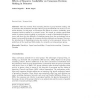Free Online Productivity Tools
i2Speak
i2Symbol
i2OCR
iTex2Img
iWeb2Print
iWeb2Shot
i2Type
iPdf2Split
iPdf2Merge
i2Bopomofo
i2Arabic
i2Style
i2Image
i2PDF
iLatex2Rtf
Sci2ools
129
click to vote
CMOT
2010
2010
Effects of resource availability on consensus decision making in primates
There has recently been increasing interest in group decision making, and in particular the mechanisms through which a group of individuals can arrive at a consensus decision. In this paper we investigate the effects of resource availability upon consensus decision making in a primate group. We extend an existing agent-based model of primate decision making to incorporate a model of diminishing foraging returns, and show that the difficulty of obtaining energy from the environment has an impact on successful strategies for consensus decision making in such groups. Moreover,
Related Content
| Added | 01 Mar 2011 |
| Updated | 01 Mar 2011 |
| Type | Journal |
| Year | 2010 |
| Where | CMOT |
| Authors | Julian Zappala, Brian Logan |
Comments (0)

